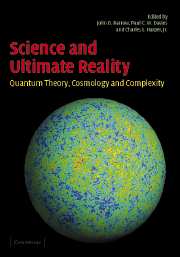Book contents
- Frontmatter
- Contents
- List of contributors
- Foreword
- Editors' preface
- Preface
- Acknowledgments
- Part I An overview of the contributions of John Archibald Wheeler
- Part II An historian's tribute to John Archibald Wheeler and scientific speculation through the ages
- Part III Quantum reality: theory
- Part IV Quantum reality: experiment
- Part V Big questions in cosmology
- 18 Cosmic inflation and the arrow of time
- 19 Cosmology and immutability
- 20 Inflation, quantum cosmology, and the anthropic principle
- 21 Parallel universes
- 22 Quantum theories of gravity: results and prospects
- 23 A genuinely evolving universe
- 24 Planck-scale models of the universe
- 25 Implications of additional spatial dimensions for questions in cosmology
- Part VI Emergence, life, and related topics
- Appendix A Science and Ultimate Reality Program Committees
- Appendix B Young Researchers Competition in honor of John Archibald Wheeler for physics graduate students, postdoctoral fellows, and young faculty
- Index
22 - Quantum theories of gravity: results and prospects
from Part V - Big questions in cosmology
Published online by Cambridge University Press: 29 March 2011
- Frontmatter
- Contents
- List of contributors
- Foreword
- Editors' preface
- Preface
- Acknowledgments
- Part I An overview of the contributions of John Archibald Wheeler
- Part II An historian's tribute to John Archibald Wheeler and scientific speculation through the ages
- Part III Quantum reality: theory
- Part IV Quantum reality: experiment
- Part V Big questions in cosmology
- 18 Cosmic inflation and the arrow of time
- 19 Cosmology and immutability
- 20 Inflation, quantum cosmology, and the anthropic principle
- 21 Parallel universes
- 22 Quantum theories of gravity: results and prospects
- 23 A genuinely evolving universe
- 24 Planck-scale models of the universe
- 25 Implications of additional spatial dimensions for questions in cosmology
- Part VI Emergence, life, and related topics
- Appendix A Science and Ultimate Reality Program Committees
- Appendix B Young Researchers Competition in honor of John Archibald Wheeler for physics graduate students, postdoctoral fellows, and young faculty
- Index
Summary
Introduction
Once, while visiting the University of Texas in 1981, I joined John Wheeler and a group of students and postdocs for lunch. As he often did, John posed a provocative question for discussion. This time he asked something like the following, “Perhaps when we die, Saint Peter gives us a physics test to determine if our time spent on earth searching for knowledge for our fellow human beings has been well spent. Because the experience can be traumatic, and we are likely to forget details, we are allowed to bring along a crib sheet, to jog our memories. But as the point of having laws of physics is that they must be simple and general, the crib sheet is only allowed to be a 3 by 5 inch file card. What would you write down on your card?”
Of course, beyond the theological issues, John was making a simple and fundamental pedagogical point. If we believe that the laws of nature are simple, a measure of our understanding of them is the compactness with which they can be expressed. As individuals and as a community, the better we understand the laws of physics, the less the space that will be required to write them.
- Type
- Chapter
- Information
- Science and Ultimate RealityQuantum Theory, Cosmology, and Complexity, pp. 492 - 527Publisher: Cambridge University PressPrint publication year: 2004



